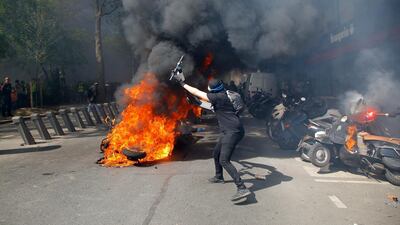French police fired tear gas and water canons at yellow vest protesters who set fires along a march through Paris on Saturday, in the 23rd straight weekend of action against President Emmanuel Macron's government.
Cars, motorbikes and barricades were set ablaze around the Place de la Republique plaza in eastern Paris. The smell of tear gas mixed with the smoke, choked the air.
Paris firefighters – who struggled last week to prevent the 12th-century Notre-Dame Cathedral from collapsing – quickly responded to extinguish fires around the city.
Masked protesters hurled paving stones and flares. Riot police repeatedly charged as they tried to contain the crowd. At least two journalists were injured in the melee. Rioters also ransacked at least two stores, with one jumping on a parked Mercedes, smashing its windshields.
Paris police said authorities detained more than 200 people by early afternoon and carried out spot checks on more than 20,000 trying to enter the capital.
Protesters view themselves as standing up for beleaguered French workers, students and retirees who have been battered by high unemployment, high taxes and shrinking purchasing power.
And many feel that the huge donations made to help rebuild the fire-ravaged Notre-Dame is another glaring sign of the inequalities in the country.
The riots contrasted sharply with the peaceful atmosphere at another march through Paris, where demonstrators mourned the Notre-Dame blaze while also keeping up the pressure on Mr Macron. They tried to march to Notre-Dame itself, but were stopped by police a few hundred meters away.
Young women at that march skipped down a street along the Seine River, accompanied by drummers and singers. One protester carried a huge wooden cross resembling those carried in Good Friday processions.
Many protesters were deeply saddened by the fire at a national monument, but at the same time are angry at the $1 billion in donations for Notre-Dame renovations that poured in from French tycoons, while their own economic demands remain largely unmet and they struggle to make ends meet.
"I think what happened at Notre-Dame is a great tragedy but humans should be more important than stones," said protester Jose Fraile.
.
"Paris is very difficult right now," said Paul Harlow of Kansas City, Missouri, as he looked sadly at the damaged Notre-Dame.
He and his wife Susan were in Paris only for a few days and didn't make it in time to see the cathedral. On Saturday, their efforts to visit museums were derailed by closed subways and barricaded roads.
"I don't think we'll be back," he said.
Other visitors showed solidarity with the yellow vest cause.
"I am not interested in joining them, but I can understand what they're angry about," said Antonio Costes, a retiree from the Paris suburb of Montreuil who came Saturday to see the damage to Notre-Dame. "There is a lot of injustice."
Mr Macron champions pro-business policies that he believes will create much-needed jobs in France. He had been scheduled to lay out his responses to yellow vest concerns on Monday night – tax cuts for lower-income households and measures to boost pensions and help single parents – but cancelled the speech after the Notre-Dame fire broke out. He is now expected to address the nation on Thursday.
Some yellow vest critics accuse Mr Macron of trying to exploit the fire for political gain. One protester carried a sign targeting Macron that read: "Pyromaniac – we are going to carbonise you."
Another huge sign read: "Victor Hugo thanks all the generous donors ready to save Notre-Dame and proposes that they do the same thing with Les Miserables," referring to the famed author's novels about the cathedral and the struggles of France's poor.
The government estimated that around 28,000 people marched on Saturday around France, including some 9,000 in Paris. That was below organisers' estimates.
The yellow vest cause started in November over a rise in fuel taxes and expanded to cover a broad list of economic complaints such as high taxes and stagnant wages.

